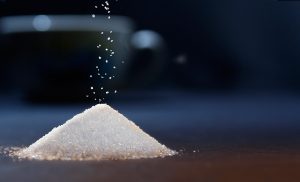Erythritol is an artificial sweetener commonly used in low-sugar and sugar-free foods. It is designed to replace sugar and calories to create “diet-friendly” results. Powdered erythritol sweeteners bake in a way almost identical to sugar and are made by combining and fermenting certain natural sugars. It is classified as a carbohydrate according to the FDA and is used not only to add sweetness to foods, but texture and bulk as well. The sweetener also prevents browning and dryness issues.
Despite its carb label, erythritol is not absorbed by the body and will not contribute to weight gain. The sweetening effect this substance provides comes from sugar alcohols. Sugar alcohols do not break down in the body and therefore do not contribute to your daily carbohydrate intake.
What Are The Side Effects Of Erythritol?
Despite the fact that the body does not break down this artificial sweetener, it can still produce a number of unpleasant side effects. Erythritol side effects typically include digestive problems and diarrhea. It may also cause bloating, cramps, and gas. Additionally, erythritol and other sugar alcohols frequently result in more water in the intestines, causing diarrhea. Nausea and headaches may occur as well. The latter symptom is often a result of excessive diarrhea because the body is dehydrated.
What Are The Dangers Of Erythritol?
Since the side effects of this substance depend on the dose, the dangers are relative to the amount ingested. How sensitive you are to the artificial sweetener and sugar alcohols, in general, may result in anything from mild gastrointestinal discomfort to severe nausea and diarrhea. Consuming large amounts of erythritol may cause serious diarrhea and nausea/vomiting if you have a heightened sensitivity, which can result in dehydration. It does not take long for the body to become dehydrated if diarrhea is continuous, which is why some people with food poisoning end up in the hospital.

